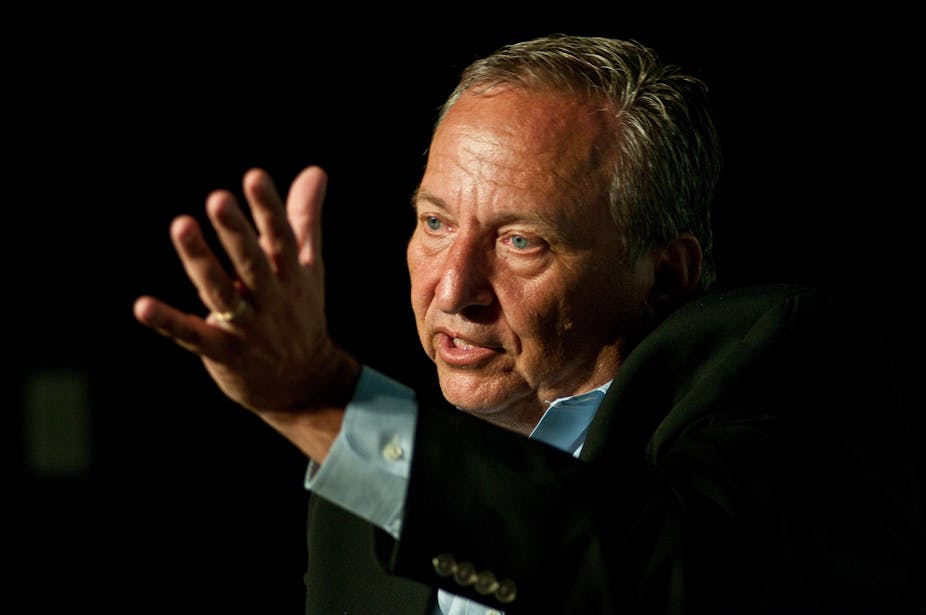When Ben Bernanke succeeded Alan Greenspan as Chair of the Board of Governors of the United States Federal Reserve in early 2006, macroeconomists were busy trying to understand the “Great Moderation” — the unusual stability of the US and other economies in the previous couple of decades. Bernanke surely did not anticipate that the global economy was about to go into meltdown, meaning that he was destined to become the most important policymaker, and arguably even the most important person, in the world.
Chairman Bernanke is nearing the end of his second term, and President Obama is likely to nominate a successor for the position soon. There is intense speculation in financial and economic circles as to who is next in line to take on the immense powers and responsibilities of this role. Two names — Janet Yellen and Larry Summers — are being heard all the time.
The most obvious successor to Bernanke is Yellen; indeed, appointment as Fed Chair would be a natural culmination of her career. As well as being an economics professor at Harvard and Berkeley, she served as Chair of President Clinton’s Council of Economic Advisors (CEA), and later as President of the San Francisco Regional Fed. Since 2010 she has been the Fed Vice-Chair.
Yellen thus has great experience in the Federal Reserve System and a deep understanding of the workings of monetary policy. Several commentators have also noted that her record as a forecaster has been exceptionally good; for example, she was one of the first economists to warn of problems in the US housing market.
It is not damning with faint praise to observe that Yellen would be the safe choice. Continuity right now would be valuable at the Fed, particularly since it now explicitly attempts to guide private-sector expectations about the future conduct of monetary policy. Were a new Chair to take monetary policy in a very different direction, some of the Fed’s valuable credibility would be lost.
Discussions of Larry Summers have a habit of including the word “brilliant”. He was tenured at Harvard at age 28, and—despite only having spent about a decade as a professor — wrote dozens of significant academic papers in that time. He left academia to become Chief Economist of the World Bank, after which he served in the US Treasury for six years, with the last two being in the role of Secretary of the Treasury under President Clinton.
Summers then became President of Harvard University, and most recently has been Director of President Obama’s National Economic Council. He has thus been a central figure in economic policymaking for much of the last two decades.
Yet there are concerns about the appointment of Summers. He has often been a highly controversial figure, most notably as Harvard President. He had a very public conflict with the noted African-American academic Cornel West. He threw the support of the university (to the tune of US$26.5 million in a court settlement) behind his friend and colleague Andrei Shleifer, when the latter was sued by the US government for allegedly profiting from the purchase of Russian stocks while serving as an adviser to Russia’s privatisation program.
Most controversial of all, he suggested in a speech that the paucity of female scientists in top universities might be due to the fact that there were more men than women at the very top of the intelligence distribution. Given that an ill-chosen adverb by the Fed Chair can move world markets, it’s hardly surprising that some people worry about Summers’ record.
There are other questions raised about Summers. He is a specialist in macroeconomics and finance rather than monetary economics. This is a subtle distinction, but it matters. In particular, it means that there is not very much on the record to indicate how he thinks about monetary policy — and the little we do know does suggest that he favours a change in the stance of monetary policy. Further, many commentators are concerned about his role in the deregulation of financial derivatives; that change in the economic environment is now seen as one of the key factors in the global financial crisis.
Unusually, there has also been significant lobbying in economic blogs and in the press for both candidates. Brad DeLong, a friend and co-author of Summers who is one of the most visible economics bloggers, recently made the case for Summers in a New York Times article. Other well-known bloggers, such as Matt Yglesias and James Hamilton, have argued that Yellen is the best choice.
Many others have also weighed in. Indeed, there has been so much speculation — and such criticism of Summers in particular — that Obama recently defended Summers against some of the criticisms that have been levelled against him.
Obama could sidestep the controversy by selecting someone other than these two. He has indicated that Donald Kohn — Bernanke’s Vice-Chair until he was succeeded by Yellen — is under consideration; there are other plausible candidates as well.
One possibility is Christina Romer, who served as Obama’s first Chair of the CEA. Like Bernanke, Romer is a monetary specialist who possesses a deep understanding of the Fed and of the Great Depression. Roger Ferguson, who was Vice-Chair of the Federal Reserve between 1999 and 2006, was viewed as a leading contender when Bernanke was nominated; he is a possible candidate this year as well. Timothy Geithner, the current Secretary of the Treasury and past President of the New York Fed, is also a possibility. Finally, Bernanke could yet be nominated for another term.
Obama therefore enjoys an embarrassment of riches: at least six highly qualified candidates, including two women and one African-American. But his choice has become surprisingly, even disturbingly, politicised. Though the position of Chair is a political appointment, the Fed is an independent body. We should all hope that President Obama makes his eventual choice based solely on who is best suited to guide monetary policy in difficult economic times.

